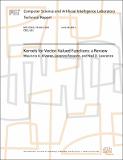Kernels for Vector-Valued Functions: a Review
Author(s)
Alvarez, Mauricio A.; Rosasco, Lorenzo; Lawrence, Neil D.
DownloadMIT-CSAIL-TR-2011-033.pdf (392.1Kb)
Other Contributors
Center for Biological and Computational Learning (CBCL)
Advisor
Tomaso Poggio
Metadata
Show full item recordAbstract
Kernel methods are among the most popular techniques in machine learning. From a frequentist/discriminative perspective they play a central role in regularization theory as they provide a natural choice for the hypotheses space and the regularization functional through the notion of reproducing kernel Hilbert spaces. From a Bayesian/generative perspective they are the key in the context of Gaussian processes, where the kernel function is also known as the covariance function. Traditionally, kernel methods have been used in supervised learning problem with scalar outputs and indeed there has been a considerable amount of work devoted to designing and learning kernels. More recently there has been an increasing interest in methods that deal with multiple outputs, motivated partly by frameworks like multitask learning. In this paper, we review different methods to design or learn valid kernel functions for multiple outputs, paying particular attention to the connection between probabilistic and functional methods.
Date issued
2011-06-30Series/Report no.
MIT-CSAIL-TR-2011-033CBCL-301
Keywords
learning theory, kernel methods, multi-output learning